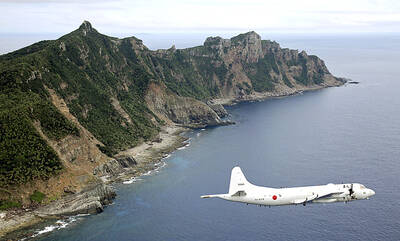Toyota Motor Corp said yesterday it would recall 4,500 Lexus vehicles in Japan to fix a computerized steering problem, with 7,000 more vehicles overseas also likely affected.
The automaker has received 12 complaints about the problem within Japan, but knows of no accidents that it has caused worldwide, spokesman Paul Nolasco said.
After being hit with a record US$16.4 million fine in the US and facing strong government criticism both at home and abroad for slow responses to safety problems, Toyota is working to react more quickly. The company on Tuesday paid the fine in the US, where it still faces hundreds of state and federal lawsuits.
The latest issue affects Toyota’s luxury Lexus “LS” line, and involves a computerized system that oversees how the steering wheel controls the tires.
The Lexus line is Toyota’s top-priced luxury sedan brand, and includes the “LS 600h” hybrid.
In addition to the 4,500 cars sold in Japan, about 7,000 have been sold abroad, including about 3,800 in the US, 150 in Europe and 800 in China, with others sold in areas such as the Middle East, Southeast Asia and Australia.
The steering system comes as standard in Japanese models, but is optional in some other regions. It varies the amount that the steering wheel turns the tires, allowing drivers to turn the wheel less at low speeds when attempting to navigate or park in tight spots and providing finer control at high speeds.
The system can take “a few seconds” to return the steering to normal after it has been adjusted, which led to complaints from drivers, Nolasco said.
He said Toyota was preparing to conduct a recall in Japan soon, but wasn’t sure of the exact timing.
Toyota recalled about 10,000 Lexus SUVs in April in the US after Consumer Reports magazine put a “Don’t Buy” recommendation on them for failing an emergency handling test. The magazine lifted the warning after the recall.

MISINFORMATION: The generated content tends to adopt China’s official stance, such as ‘Taiwan is currently governed by the Chinese central government,’ the NSB said Five China-developed artificial intelligence (AI) language models exhibit cybersecurity risks and content biases, an inspection conducted by the National Security Bureau (NSB) showed. The five AI tools are: DeepSeek, Doubao (豆包), Yiyan (文心一言), Tongyi (通義千問) and Yuanbao (騰訊元寶), the bureau said, advising people to remain vigilant to protect personal data privacy and corporate business secrets. The NSB said it, in accordance with the National Intelligence Services Act (國家情報工作法), has reviewed international cybersecurity reports and intelligence, and coordinated with the Ministry of Justice Investigation Bureau and the National Police Agency’s Criminal Investigation Bureau to conduct an inspection of China-made AI language

BOOST IN CONFIDENCE: The sale sends a clear message of support for Taiwan and dispels rumors that US President Donald Trump ‘sold out’ the nation, an expert said The US government on Thursday announced a possible sale to Taiwan of fighter jet parts, which was estimated to cost about US$330 million, in a move that an expert said “sends a clear message of support for Taiwan” amid fears that Washington might be wavering in its attitude toward Taipei. It was the first announcement of an arms sale to Taiwan since US President Donald Trump returned to the White House earlier this year. The proposed package includes non-standard components, spare and repair parts, consumables and accessories, as well repair and return support for the F-16, C-130 and Indigenous Defense Fighter aircraft,

CHECKING BOUNDARIES: China wants to disrupt solidarity among democracies and test their red lines, but it is instead pushing nations to become more united, an expert said The US Department of State on Friday expressed deep concern over a Chinese public security agency’s investigation into Legislator Puma Shen (沈伯洋) for “secession.” “China’s actions threaten free speech and erode norms that have underpinned the cross-strait ‘status quo’ for decades,” a US Department of State spokesperson said. The Chongqing Municipal Public Security Bureau late last month listed Shen as “wanted” and launched an investigation into alleged “secession-related” criminal activities, including his founding of the Kuma Academy, a civil defense organization that prepares people for an invasion by China. The spokesperson said that the US was “deeply concerned” about the bureau investigating Shen

DISPUTE: A Chinese official prompted a formal protest from Tokyo by saying that ‘the dirty head that sticks itself out must be cut off,’ after Takaichi’s Taiwan remarks Four armed China Coast Guard vessels yesterday morning sailed through disputed waters controlled by Japan, amid a diplomatic spat following Japanese Prime Minister Sanae Takaichi’s comments on Taiwan. The four ships sailed around the Senkaku Islands — known as the Diaoyutai Islands (釣魚台) to Taiwan, and which Taiwan and China also claim — on Saturday before entering Japanese waters yesterday and left, the Japan Coast Guard said. The China Coast Guard said in a statement that it carried out a “rights enforcement patrol” through the waters and that it was a lawful operation. As of the end of last month,